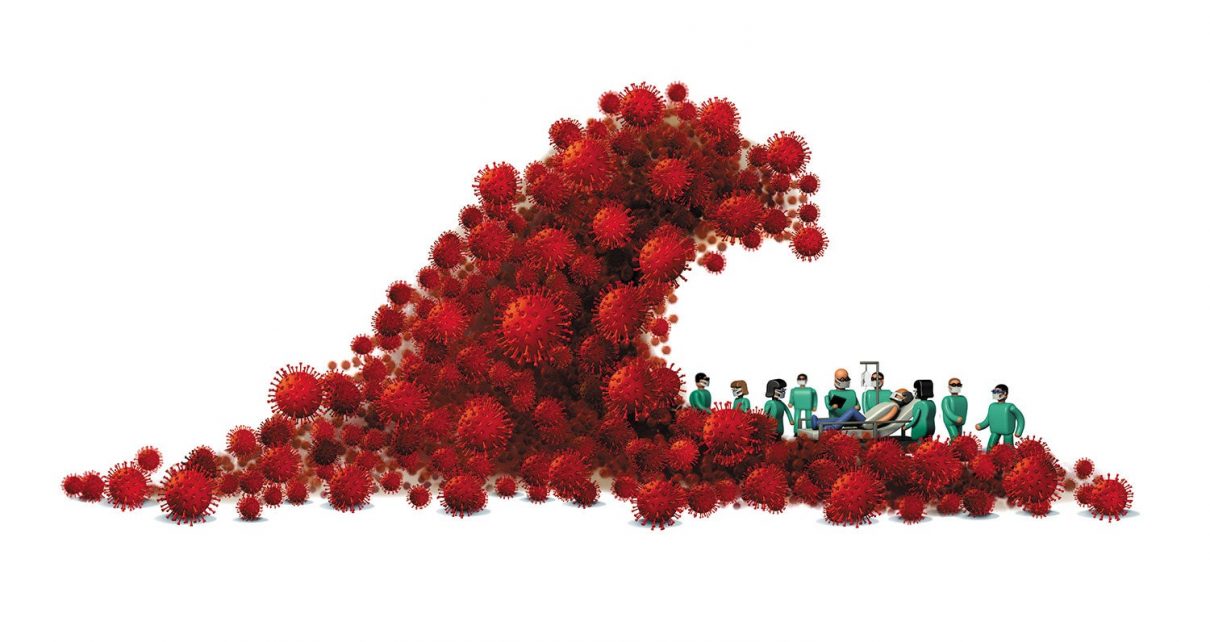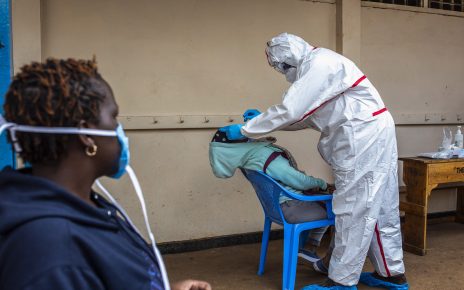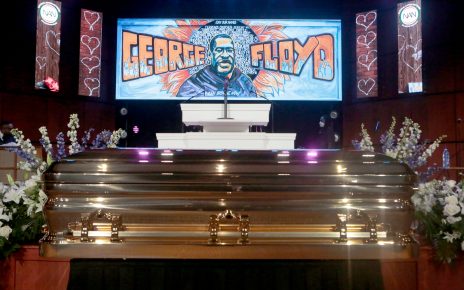After his roughest days in a New York City emergency room, physician Matthew Bai feels his whole body relax when he sees his wife and 17-month-old daughter. “My light at the end of the tunnel is going home to family,” Bai says. When Manhattan’s Mount Sinai Hospital started to overflow with COVID-19 patients in late March, however, Bai and his wife decided she should take their toddler and stay with her parents in New Jersey. The risk of spreading the virus to his family was too great. Now Bai confronts a daily cascade of patients who are struggling to breathe, in an ER busier than he has ever witnessed it. On his mind, always, is whether he will be able to keep his staff safe. All doctors have bad shifts, but now those days repeat, piling up. At night, virtual story time with his daughter is nowhere as soothing as the real thing. “I honestly have no idea how I feel,” Bai says. “I go to work, and at the end of the day, I go to sleep. I have no time to digest any of this.”
Medicine is a stressful profession under normal circumstances. The physical demands, psychological strain and ineffective work processes can lead to burnout, a condition that affects up to 50 percent of physicians in the U.S., says Colin West, an internist who has studied physician well-being at the Mayo Clinic for more than 15 years. A 2018 review in the journal Cureus described it as “a combination of exhaustion, cynicism, and perceived inefficacy.” Burned-out clinicians are more likely to quit their jobs. Their patients may have worse outcomes. Yet burnout cannot capture what doctors, nurses, paramedics and others are experiencing as coronavirus overwhelms the health care system. “Burnout is a chronic response to health care conditions,” West says. “This is an unprecedented acute crisis.”
As the pandemic upends much of society, frontline health care workers are shouldering the burden of a systemic lack of preparation. In the U.S., a sluggish government response, along with the bungled rollout of testing, allowed the virus to spread widely. Years of running lean operations left many hospitals without the resources to quickly expand care. Global demand for personal protective equipment (PPE) and ventilators made these crucial supplies scarce. Backup stockpiles proved too small, and efforts to bolster supplies were uncoordinated or, worse, forced hospitals and jurisdictions to compete with one another. Now ERs in hard-hit areas struggle to keep up with a flood of critically ill patients. Staff in eerily quiet hospitals elsewhere look on, wondering if the virus will overwhelm them next. Nurses facilitate final phone calls between the dying and their loved ones who are barred from entry. As morgues overflow, refrigerated trucks arrive to house the bodies.
“Our health care professionals are seeing incredibly sick people in what is really a tidal wave washing over them, and they are leaning into that work because it’s what we do,” West says. But leaning into extreme uncertainty for weeks and months on end could have significant impacts on their mental well-being. More than any other group, they are in danger of getting sick from the constant exposure to SARS-CoV-2. As of April, the virus has infected more than 9,000 health care workers in the U.S. and killed 27, according to the Centers for Disease Control and Prevention. Hundreds of clinicians have died worldwide. Like Bai, many worry about spreading the disease to their patients and loved ones; young medical residents are advising one another to write living wills. Some hospitals have muzzled their staffers, citing concerns over the spread of misinformation and patient privacy; around the world, clinicians who have spoken out about the resource shortages or shared their experiences have been reprimanded or fired by their institutions. Many experts predict that, taken together, these traumatic effects of the pandemic will reverberate long after the virus itself is contained.
Trauma is often associated with something overtly violent, such as a car accident or a shooting. But Dutch philosopher Ciano Aydin describes a situation as traumatic when it “violates” familiar expectations about someone’s life and world, sending them into a “state of extreme confusion and uncertainty.” In the case of this pandemic, prolonged uncertainty is compounded by the moral anguish health care professionals face when they do not have adequate resources to treat critically ill patients, says Wendy Dean, a psychiatrist and co-founder of the nonprofit Moral Injury of Healthcare.
Moral injury, a term borrowed from the military, occurs when a person does something that goes against his or her deeply held moral beliefs, Dean says. In medicine, it can occur when the business side of health care hinders a physician’s ability to care for patients; for instance, if there are not enough ventilators for the number of COVID-19 patients who need them. Physicians are not used to doing triage, to choosing who gets lifesaving support and who does not, explains G. Richard Holt, an otolaryngologist and bioethicist at the University of Texas Health Science Center at San Antonio. “We’re trained in treating one patient at a time, but in the worst of an epidemic, you have to think about the greatest good for the greatest number,” Holt says. Studies in soldiers suggest moral injury impedes normal emotional, psychological and social functioning and often occurs in people with post-traumatic stress disorder. “I think the real reckoning is going to come when this is over,” Dean says.
The emotional toll of COVID-19 is tricky to predict. During a natural disaster, medical professionals often deliver care after the immediate threat has passed, and those providers are able to go home and decompress at the end of an upsetting day, says Joshua Morganstein, chair of the American Psychiatric Association’s Committee on the Psychiatric Dimensions of Disaster. When you are worried about bringing the disaster home with you, no place is safe. Health care workers are grappling with the upheaval of social and economic life along with the rest of us; they are exposed to the constant noise of grim news. Some are tuning out coronavirus coverage as a coping mechanism. “We have to figure out what our reaction would have looked like pre-iPhone,” says Suneel Dhand, an internist who works at hospitals in Massachusetts. “I’m concerned about all the people absorbing so much doom and gloom through social media.”
Jessica Gold, a psychiatrist at the Washington University School of Medicine in St. Louis, and other experts believe health care workers as a group could develop high rates of anxiety, depression, substance use issues, acute stress and, eventually, post-traumatic stress as a result of what they are experiencing on the pandemic front lines. Because this event is unprecedented, Gold worries the psychological damages will be unprecedented, too. Data from other outbreaks, while limited, support these concerns. A small study of health care workers during the 2003 SARS outbreak, for example, found that 89 percent of workers at high risk of contracting the virus reported negative psychological effects. Another study found SARS-related fear was correlated with symptoms of PTSD.
One survey of 1,257 physicians and nurses during the height of the COVID-19 pandemic in China found that about 50 percent of respondents reported symptoms of depression, 44 percent reported symptoms of anxiety and 34 percent reported insomnia. Medical professionals are already at risk for many of these conditions at baseline—medical occupations have among the highest rates of suicide—yet they are typically unlikely to seek help, Gold says. Most do not have the time or flexibility to go see a therapist during a standard nine-to-five workday, she notes, and the stigma still attached to psychological problems leads many to suffer silently. “We have never had a mental health system that could support the needs of the population in general, let alone the population that will now be in need,” Gold says.
Institutions such as UNC Health in North Carolina have expanded therapy options for providers with telehealth and more flexible scheduling, as well as set up a support hotline. In the U.K., the COVID Trauma Response Working Group provides guidance, based on trauma psychology research, for proactive interventions. The right support can even foster resilience. “Some people will find they experience a sense of an increase in their own confidence or ability to manage future stressors,” says Morganstein, describing a process called post-traumatic growth.
While these efforts are a start, Gold emphasizes that expanded mental health support needs to be ongoing and wide in scope, addressing systemic problems such as a nationwide mental health care professional shortage and regulatory hurdles that limit telemedicine services. Teletherapy, meditation apps and other virtual health services have already made inroads with the population at large in the past few months, and Gold and other therapists see it as a crucial tool for reaching health care workers as well.
In cities across the world, people in lockdown have gathered at their windows to clap and cheer for essential workers every evening. In New York, Bai reports that local restaurants send a steady stream of food to the hospital and that friends and strangers reach out with messages of appreciation. All of this boosts morale immensely, Bai says. But the hero worship of health care workers only goes so far to protect them from mental anguish. Like soldiers coming back from deployment, it will take time for health care professionals to process and heal, Dean says. When the acute medical crisis ends, a mental health crisis could emerge. This time we need to be ready.
Read more about the coronavirus outbreak here.



